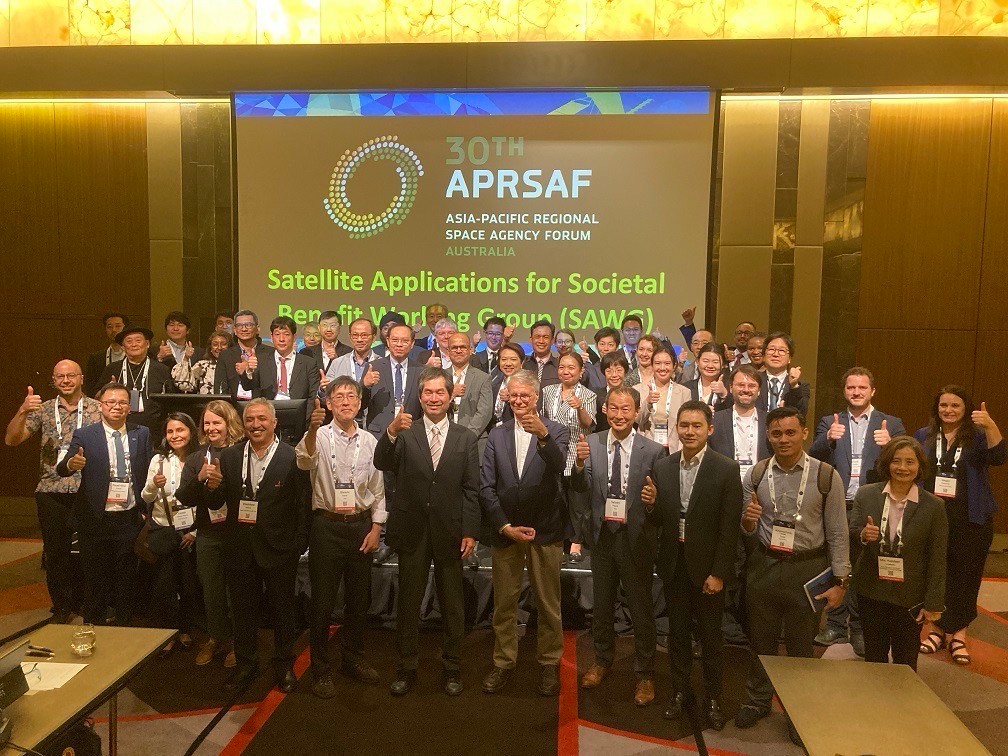
On 26-27 November 2024, Dr. Sumanya Ngandee, the AFSIS Manager, participated in the 30th session of the Asia-Pacific Regional Space Agency Forum (APRSAF-30), held in Perth, Australia. This event was co-organized by the Australian Space Agency (ASA), the Ministry of Education, Culture, Sports, Science and Technology (MEXT) of Japan, and the Japan Aerospace Exploration Agency (JAXA). The forum's focus was to bring together stakeholders from various space agencies in the Asia-Pacific region to address pressing regional issues through space-based solutions.
One of the key sessions, Satellite Applications for Societal Benefit (SAWG), aimed to promote and facilitate the use of space-based systems, such as Earth observation and navigation satellites, in conjunction with ground-based information. This approach seeks to address a wide range of common social issues in the region while fostering sustainable cooperation between space agencies, stakeholders, development aid organizations, and end-users.
During the SAWG session, Dr. Sumanya Ngandee delivered a presentation focused on the Satellite Applications for Crop Area Estimation and Growing Conditions for the ASEAN Food Security Information System (AFSIS).
She outlined the role of the Rice Growing Outlook (RGO) activities and the use of the INAHOR system (International Asian Harvest mOnitoring system for Rice) for estimating rice planted areas, which is a critical tool for tracking agricultural trends in the region. Her presentation also highlighted collaborations with key organizations, including JAXA, Ministry of Agriculture, Forestry and Fisheries (MAFF) of Japan, ISRO (Indian Space Research Organisation), RESTEC (Remote Sensing Technology Center of Japan) and GISTDA (Geo-Informatics and Space Technology Development Agency)
Furthermore, she emphasized the critical role of remote sensing technologies in providing accurate agricultural information to support food security decision-making. She also underscored the importance of capacity building in ASEAN region, such as workshops on rice mapping using the INAHOR system, which are essential for empowering local stakeholders to make data-driven decisions.
Her presentation highlighted not only the technological advances in satellite applications but also the vital need for regional cooperation and knowledge exchange she also expressed deep gratitude to the organizations involved in the SAFE Agromet Project, which aims to integrate satellite data and advance the use of remote sensing technologies into agricultural decision-making processes, ultimately strengthening food security in the region to ensure sustainable food security in ASEAN nations. The ongoing collaborations reflect a shared commitment to addressing common agricultural challenges through space-based solutions and human resource development in the use of satellite-derived agricultural information.






.jpg)
On 13–15 January 2026, the Office of Agricultural Economics (OAE), Thailand, in collaboration with the Ministry of Agriculture, Forestry and Fisheries (MAFF), Japan, and the AFSIS Secretariat, conducted the 1st Meeting of Japan–Thailand Expert Dialogue on Agricultural Statistics. The meeting was held at the Office of Agricultural Economics and field survey activities in Chonburi Province.

On 3–4 December 2025, the ASEAN Food Security Information System (AFSIS) Secretariat participated in the ASEAN Plus Three Emergency Rice Reserve (APTERR) Table Top Exercise (TTX) held in Bandar Seri Begawan, Brunei Darussalam.
/LINE_ALBUM_KRC_Cambodia_251204_13.jpg)
AFSIS and Development of Human Resources" in Cambodia On 27 November 2025, Mr. Charapon Chantorn, Deputy AFSIS Manager, participated in the Completion and Handover Ceremony of the project “Establishing the Real-Time ASEAN Food Security Information System (AFSIS) and Development of Human Resources, Phase 3 – Pilot Project on Strategic Crop Forecasting System for Food Security in Cambodia.” The ceremony was held in Phnom Penh, Cambodia, and jointly hosted by the Ministry of Agriculture, Food and Rural Affairs (MAFRA) of the Republic of Korea, the Ministry of Agriculture, Forestry and Fisheries (MAFF) of Cambodia, and the Korea Rural Community Corporation (KRC).

AFSIS Participated in APRSAF-31 to Strengthen Space Technology Cooperation for Regional Food Security On 18–19 November 2025, in Cebu City, the Republic of the Philippines, the ASEAN Food Security Information System (AFSIS) Secretariat, represented by Mr. Charapon Chantorn, Deputy AFSIS Manager, participated in the 31st Asia-Pacific Regional Space Agency Forum (APRSAF-31). The Forum, a key platform for promoting regional cooperation in space technology across the Asia-Pacific region, was co-organized by the Philippines Space Agency (PhilSA), the Ministry of Education, Culture, Sports, Science and Technology (MEXT) of Japan, and the Japan Aerospace Exploration Agency (JAXA).